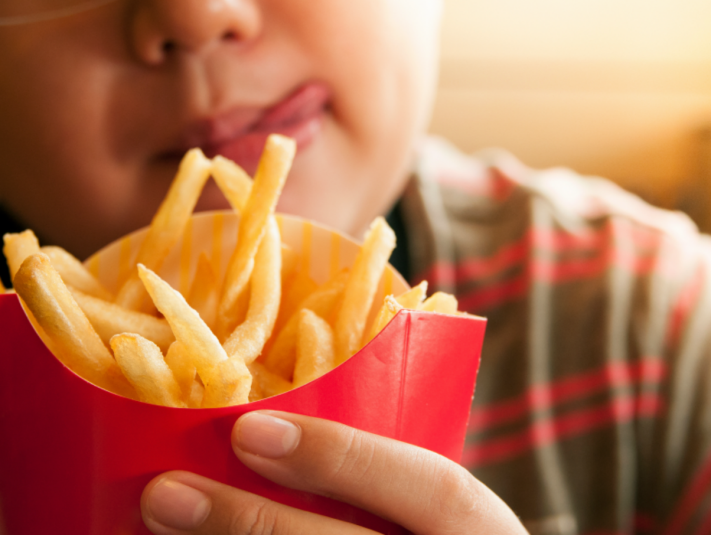There’s a Right and a Wrong Way to Talk to Our Kids About Eating

Make no mistake about it: Words matter. And as a mom, I might argue that no words matter more than those that you speak around your kids. My older son, who’s four, is constantly repeating the things he hears me say — even when they’re not addressed to him — so like many parents, I make special effort to choose my words carefully whenever he’s in earshot.
New research is suggesting that I’m right to do so — particularly when it comes to my kid’s eating habits. A small study published in the Journal of Nutrition Education and Behavior has found a slight difference in the way parents of kids at healthy weights and parents of obese children speak to their kids — and it’s not what you might think.
Direct Versus Indirect Language
Parents of obese kids sometimes get a bad wrap, don’t they? One of the biggest stereotypes attached to parents of obese children is that they allow their children to eat whatever they want, or that they don’t know how to tell their children when to stop snacking. The study, conducted at University of Michigan C.S. Mott Children’s Hospital in Ann Arbor, actually demonstrated that the reverse was true: Parents of obese children were actually more likely to use strong, direct statements to attempt to curb their kids from overeating. Parents of children at healthier weights, on the other hand, were more likely to use indirect language to dissuade their kids from eating too much.
Led by lead author Megan Pesch, M.D., a developmental and behavioral pediatrician, researchers videotaped 237 mothers and children (aged four to eight) who were seated alone in a room and presented with different types of foods, including chocolate cupcakes. While eating the cupcakes, moms of kids with obesity were more likely to use direct commands, such as, “Only eat one” or “You’re eating both of those? No! Don’t! Oh my gosh.” Meanwhile, mothers of children who did not have obesity were more likely to guide children with indirect statements like, “That’s too much. You haven’t had dinner.”
How to Talk to Your Kids About Food
Which style of parenting sounds more like you? We all know the scenario: A plate of Oreo cookies or a big bag of leftover Halloween candy sits on the table, and your little one’s tiny hands just keep reaching for more. Do you stop your child with a specific, strongly-worded directive — “That’s the last one!” — or do you utter a gentler, more subtle statement to hopefully stop the junk food free-for-all?
“There is some conflicting advice on the best approach,” said Dr. Pesch. “On one hand, overly restricting food could backfire and actually lead to overeating. But parents also want to encourage healthy habits. We wanted to study these family dynamics to see how adults try to get kids to eat less junk food.”
A Sensitive Topic
I don’t know about you, but I often try to be as straightforward as possible with my kids — especially my older son — when I’m trying to get them to do something. Clear, direct statements seem to work better with my pre-schooler, like the many I said tonight: “You have two minutes to put your pajamas on,” or “If you hit your brother again, you’ll be getting a time out,” or my usual end-of-the-night, slightly hysterical “It’s time to go to sleep!” Indeed, in most other areas of child development, like discipline, Pesch points out, direct and firm statements seem to help children better understand how to behave. But eating, it seems, is different.
“Indirect or subtle statements don’t seem to work as well in general parenting,” said Pesch. “Direct messages are usually easier for kids to interpret and understand where the limits are. But there’s more sensitivity around how to talk to children about eating and weight.”
It’s a good point — and it’s a worthy concept to examine. Considering one in three American children fits the medical definition of obese, learning how we as moms can better talk to our kids about food is imperative. Of course, I never want to speak to my kids in a way that fuels an unhealthy weight gain; what parent does? So if it means I have to think a little more carefully about what I say and how I say it, that’s a (direct!) instruction I’m happy to obey.
More from FIRST
Let It Snow: How to Burn Major Calories Having Winter Fun
Study Finds Connection Between Stubbornness and Living Longer
Kids Who Use Phones Before Bed More Likely to Have High BMIs, Study Finds













